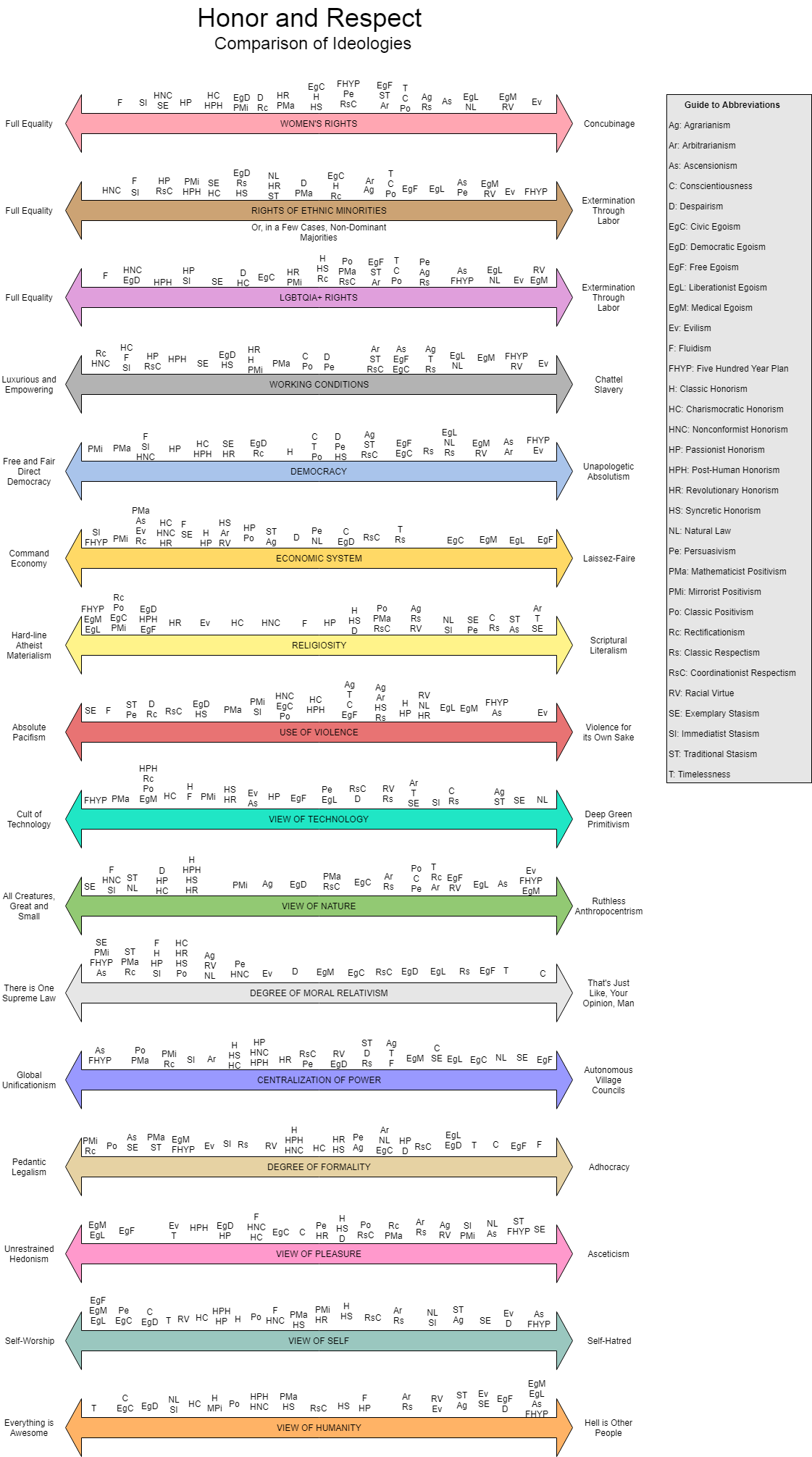Based on stimulating conversation in other threads, I've come up with a little challenge. It's no secret that I'm fervently into alternative ideologies and political parties and I wanted to see what you all could come up with, with a little twist: rather than just create a new ideology, I think it would be interesting to go a little deeper and come up with a new axis on a political spectrum outside of the primary two, with a pre-1900 POD. Obviously the golden example is (surprise, surprise) Look to the West, where the two major ideological camps, Societism and Diversitarianism, are arranged on a spectrum of less or more cultural diversity (respectively) rather than a Progressive-Conservative or Libertarian-Authoritarian axis.
To get the ball rolling here's a little something that occurred to me: in a world where Owenist utopian communities become politically active at the local level in the 1830s, some form of confederal utopian socialism could arise as a big tent social reform movement. Given that such groups tended toward an isolationist or at least rural character the socialism as practiced in the cities would hew closer to efforts focused on things like unions and city living conditions. If the USSR never comes into existence, the Red Scare is butterflied away, replaced with a low level crackdown on anarchist elements. Even if the Great Depression never happens some form of economic slowdown is inevitable. A variant of Technocracy becomes politically popular, coalitions are formed, parties shift and merge and fade away, and by the late 20th century the US is deep in a new party system, divided into two fractious coalitions at either end of a Materialist-Spiritual divide.
The rationalist pole of the spectrum is dominated by the Social Technocrats, a class collaborationist, mostly urban party focused on improving economic efficiency by balancing the demands of labor and capital. Although viewing a moderate welfare state as a long term positive investment, the So-Tecs have a troubled history of race relations, largely rooted in a backlash to workplace competition resulting from an alternate version of the Great Migration.
On the metaphysical end of the spectrum the Theodemocrats have united an extremely diverse rural coalition around the ideals of social experimentation and radical reforms to the status quo, embracing everyone from communes to compounds. In the early 20th century the current Theodem coalition united in a push for federal Prohibition. The failure of that movement, coupled with a perceived general Federal disinterest in promoting so called "moral reforms" cemented a collection of groups that under other circumstances would be violently opposed to each other, especially in the wake of the influx of New Age and fundamentalist beliefs. Officially organized on a deist platform the Theodemocrats believe in some form of transmundane existence but do not take a unified position on the nature of that existence.
So there you have it! Any solid ideas would be welcome, and I hope for a robust discussion.
To get the ball rolling here's a little something that occurred to me: in a world where Owenist utopian communities become politically active at the local level in the 1830s, some form of confederal utopian socialism could arise as a big tent social reform movement. Given that such groups tended toward an isolationist or at least rural character the socialism as practiced in the cities would hew closer to efforts focused on things like unions and city living conditions. If the USSR never comes into existence, the Red Scare is butterflied away, replaced with a low level crackdown on anarchist elements. Even if the Great Depression never happens some form of economic slowdown is inevitable. A variant of Technocracy becomes politically popular, coalitions are formed, parties shift and merge and fade away, and by the late 20th century the US is deep in a new party system, divided into two fractious coalitions at either end of a Materialist-Spiritual divide.
The rationalist pole of the spectrum is dominated by the Social Technocrats, a class collaborationist, mostly urban party focused on improving economic efficiency by balancing the demands of labor and capital. Although viewing a moderate welfare state as a long term positive investment, the So-Tecs have a troubled history of race relations, largely rooted in a backlash to workplace competition resulting from an alternate version of the Great Migration.
On the metaphysical end of the spectrum the Theodemocrats have united an extremely diverse rural coalition around the ideals of social experimentation and radical reforms to the status quo, embracing everyone from communes to compounds. In the early 20th century the current Theodem coalition united in a push for federal Prohibition. The failure of that movement, coupled with a perceived general Federal disinterest in promoting so called "moral reforms" cemented a collection of groups that under other circumstances would be violently opposed to each other, especially in the wake of the influx of New Age and fundamentalist beliefs. Officially organized on a deist platform the Theodemocrats believe in some form of transmundane existence but do not take a unified position on the nature of that existence.
So there you have it! Any solid ideas would be welcome, and I hope for a robust discussion.

